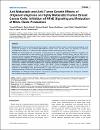Anti-Metastatic and Anti-Tumor Growth Effects of Origanum majorana on Highly Metastatic Human Breast Cancer Cells: Inhibition of NFκB Signaling and Reduction of Nitric Oxide Production
| Author | Al Dhaheri, Yusra |
| Author | Attoub, Samir |
| Author | Arafat, Kholoud |
| Author | AbuQamar, Synan |
| Author | Viallet, Jean |
| Author | Saleh, Alaaeldin |
| Author | Al Agha, Hala |
| Author | Eid, Ali |
| Author | Iratni, Rabah |
| Available date | 2016-03-31T14:00:59Z |
| Publication Date | 2013-07 |
| Publication Name | PLoS ONE |
| Resource | Scopus |
| Citation | Al Dhaheri Y, Attoub S, Arafat K, AbuQamar S, Viallet J, Saleh A, et al. (2013) Anti-Metastatic and Anti-Tumor Growth Effects of Origanum majorana on Highly Metastatic Human Breast Cancer Cells: Inhibition of NF?B Signaling and Reduction of Nitric Oxide Production. PLoS ONE 8(7): e68808. |
| ISSN | 1932-6203 |
| Abstract | Background: We have recently reported that Origanum majorana exhibits anticancer activity by promoting cell cycle arrest and apoptosis of the metastatic MDA-MB-231 breast cancer cell line. Here, we extended our study by investigating the effect of O. majorana on the migration, invasion and tumor growth of these cells. Results: We demonstrate that non-cytotoxic concentrations of O. majorana significantly inhibited the migration and invasion of the MDA-MB-231 cells as shown by wound-healing and matrigel invasion assays. We also show that O. majorana induce homotypic aggregation of MDA-MB-231 associated with an upregulation of E-cadherin protein and promoter activity. Furthermore, we show that O. majorana decrease the adhesion of MDA-MB-231 to HUVECs and inhibits transendothelial migration of MDA-MB-231 through TNF-α-activated HUVECs. Gelatin zymography assay shows that O. majorana suppresses the activities of matrix metalloproteinase-2 and -9 (MMP-2 and MMP-9). ELISA, RT-PCR and Western blot results revealed that O. majorana decreases the expression of MMP-2, MMP-9, urokinase plasminogen activator receptor (uPAR), ICAM-1 and VEGF. Further investigation revealed that O. majorana suppresses the phosphorylation of IκB, downregulates the nuclear level of NFκB and reduces Nitric Oxide (NO) production in MDA-MB-231 cells. Most importantly, by using chick embryo tumor growth assay, we also show that O. majorana promotes inhibition of tumor growth and metastasis in vivo. Conclusion: Our findings identify Origanum majorana as a promising chemopreventive and therapeutic candidate that modulate breast cancer growth and metastasis. |
| Sponsor | College of Science (UAEU) interdisciplinary research grant to RI and by a Terry Fox research grant to SA. |
| Language | en |
| Publisher | Public Library of Science |
| Subject | Breast cancer Metastasis Nitric Oxide Cancer treatment Cancer cell migration Embryos Cell migration Angiogenesis |
| Type | Article |
| Issue Number | 7 |
| Volume Number | 8 |
Files in this item
This item appears in the following Collection(s)
-
Biological & Environmental Sciences [932 items ]


